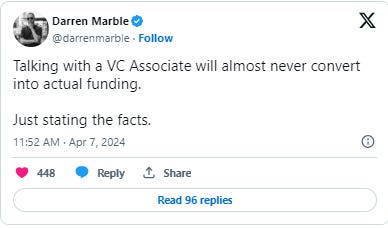Hey y’all — I’ve been spending a lot more time on X recently so this week’s deep dive is about the hottest take of the week:
If you look through the replies and quotes you’ll notice that founders largely agree, while investors largely cast doubt.
Some of the founder grumbling is likely sour grapes, but hyper-successful founders like Brett Adcock also agreed.
This week I’m answering:
What associates are actually responsible for
Whether pitching associates is worth it
What other value networking with associates can offer
Should Founders Talk to VC Associates?
What Do Associates Do?
Like most broad questions the answer is “it depends.”
Based on associates I personally know or have known, the role tends to include:
Deal Sourcing
As you’d expect, associates look for opportunities for their firm to invest in.
Each firm is unique. At some, the GPs don’t keep their ear to the ground in the zeitgeist quite as much and genuinely rely on associates to keep them informed about trends. These firms give you the best shot at getting a deal if you go through an associate.
But other firms have active GPs who maintain their own channels to get inbound from friends or other sources of warm referrals. And the deals they hear about this way tend to be more interesting to them specifically because the founder passed what Marc Andreessen calls “the first test.”
In venture the hottest deals never get shared around in the circles an associate would be likely to hear about them until the round is closed.
As a result, an associate’s deal sourcing work is better described as “networking” in most cases. A good rule of thumb is that the more often you see an associate at tech parties and founder/investor mixers, the lower the likelihood their firm will end up taking allocation if you go through them.
However, even in this case, they aren’t useless (I’ll explain why later in this piece).
Due Diligence
Someone’s got to size the market, perform blind reference calls, and see what can be learned about competitors.
Sometimes this means reaching out to competitors directly and forming a relationship with them.
Typically this is to genuinely consider investing in them instead, but bad natured firms do send associates on fishing expeditions to learn what they can without a real likelihood of investing.
The tough part for founders?
You never really know which it is.
Portco Support
Once the money’s in the bank, you might end up talking to an associate more often than your GP.
Associates get saddled with helping out with your asks, in many cases, while GPs offer strategic guidance.
When we wrapped up our Series A from a16z, we set up a WhatsApp groupchat with our GP and two partners (a16z doesn’t use the terms associate or principal) where we shared updates, discussed strategy, and made asks.
All three were highly engaged but the more junior partners took the lead on execution in most cases.
IC Meeting Prep
The GPs may be ok doing napkin math, but there’s usually an associate or two behind them cranking out a financial model, investment memo, or market map for the investment committee at the fund to consider.
This can become a large part of the job. I’ve even had associates break out their laptops to wrap up a model for their GP in the backseat of a car I was driving before.
What Happens When You Pitch an Associate?
Become a member to join the community, get access to all 90+ deep dives, our founder accountability challenge, and fireside chats with experts.
I can also help your startup in a few other ways:
Growth
Grow your audience + generate leads with my growth service.
Fundraising
Share your round with hundreds of investors in my personal network.
Hiring
Hire curated candidates from top startups and communities.
Advising
I’ll help solve a specific challenge you’re facing with your startup.
🚀 Advertise in my newsletter to get in front of 75,000+ founders.
Keep reading with a 7-day free trial
Subscribe to Houck's Newsletter to keep reading this post and get 7 days of free access to the full post archives.



